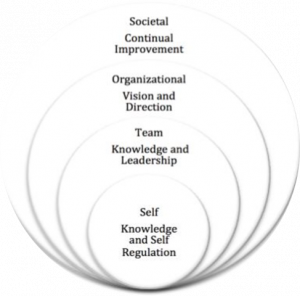Workshop 1: Personal Values and Self Leadership
Catherine Dang; John Donald; and Technical Editor: Jack Miranda

INTRODUCTION
Why leadership?
Leadership was originally thought of as a linear progression. However, referring to the graphic demonstrates how different domains of leadership build and relate to each other. The innermost domains act as foundations for the encompassing domains. While each skill in every domain is distinct, the outer domains still rely on the inner for a foundation. In other words, it’ll be very hard to lead a team or organization if you cannot lead yourself. Therefore our learning goal today is about leading ourselves

AGENDA
There will be three main concepts that you’ll find in this workshop. They include:
- Lifeview – This outlines your beliefs and will ground you to prepare for your self-leadership journey
- Values – Based on your lifeview, you will determine the person you want to be, based on what you believe in
- Leadership Philosophy – A guideline of what you can do to become you want to be
WHAT IS A LIFEVIEW?
A lifeview is a sum of beliefs, values, goals, and purpose in your individual life. Think of a lifeview as a cheat sheet to refer to that explains the critical perceptive that you want to live by. It contains the basis for understanding life through your personal lens and includes matters of utmost concern. Another way of thinking about a life view is if someone were to write a biography about you, your lifeview would be like the introduction page that tells the reader what you believed in, what you worked towards, and your larger goals in life.
Lifeviews are a personal cheatsheet and remind you why you’re doing certain actions over other choices. Besides being accountable it also focuses your energy in the right direction. If you don’t know where you’re going, as long as your actions still resonate with your personal lifeview, it ensures your time is well placed even if you are unsure of the outcome of your actions. That being said, your lifeview will be broad and vague on purpose, it doesn’t care about a specific job or specific detail at a point in your life but rather provides a long-term vision of your life.
- How well does your work align with your lifeview?
- How can you use this lifeview outside this workshop?
IDENTIFY YOUR VALUES
This quote from Brené Brown does a good job at explaining what a value is:
Instead of just saying and professing your lifeview you will learn how to practice and apply them every day
WHY ARE VALUES IMPORTANT?
So how will knowing your values benefit you? Knowing your values helps ground us and let you use them to act as a compass. For example, when you are making hard or controversial decisions you can reply to your values as a guide for us. Living by your values is not only a very important component of leadership and teamwork but also allows you to live your life without ever lying to yourself. Knowing your values and being able to talk about them with other teammates and well as trying to understand other people’s values paves the way for effective communication.
ACTIVITY 2: VALUES WORKSHEET
For this activity, you will be presented with a large list of values. Your task is to be able to choose only 3 core values from the list. Try doing this you a partner so you can compare your different values afterward.
Here are a couple of hints to make this task less daunting:
- Look at your lifeview for inspiration. Usually, your lifeview is subconsciously pointing you toward your values.
- Use the process of elimination. Go through rounds of elimination. Immediately cross off values that don’t resonate with you. As your list of values becomes small think back to situations where you had to make a tough life decision and what you were thinking about when you made the decision. The way you were thinking shows your underlying values.

REFLECTION
- After comparing your values with your partner, did you have any similar values?
- How would knowing your team members’ values help you resolve any conflicts? How will your own personal values help resolve conflict?
1Brown, B (2018). Dare to Lead: Brave Work. Tough Conversations. Whole Hearts. Ebury Publishing
LEADERSHIP PHILOSOPHY
WHAT IS LEADERSHIP PHILOSOPHY?
Take a look at this quote from Jon Mertz, where he clearly defines what is leadership philosphy is:
This leadership philosophy helps you to become your own unique leaders by taking your values, defining them, and then seeing how you can apply them in your everyday life.
WHY IS LEADERSHIP PHILOSOPHY IMPORTANT?
By having a leadership philosophy you also have a plan. So instead of hoping that you’ll become a great leader out of nowhere, you’ll have concrete steps to become the leader where you want to be. And offers a good place for accountability
ACTIVITY 3: CREATING YOUR LEADERSHIP PHILOSOPHY
Fill in the provided worksheet which will help you develop your own lifeview. This requires you to have your 3 values ready so you can fill out the worksheet. Here are a couple of things to note when filling each row.
- Define your values to what it means to you. Since even if people choose the same values, it may mean different to other people
- For behaviors, write something down that you do every day that you can see yourself doing
2 Mertz, J (n.d.). How to Develop a Leadership Philospgoy Thin Difference.
REFLECTION
- Share your rows with your partner and afterward let them their rows with you. What elements are similar? What are different?
- Think about a famous leader. After completing your sheet do you think that they have the same leadership philosophy as you? Why or why not?
WORKSHOP KEY TAKEAWAYS
Today you drafted a lifeview and determined your larger goals in life, you discovered your personal values and why it’s important to do so and then used your lifeview and values to determine what type of leader you have to be to stay true to yourselves. Recall the leadership domains, to become a productive leader you must be familiar with the inner self domain before advancing to the larger outwards domains. In this workshop, you have taken the first steps to lead yourself before you can lead others.
RESOURCES
Click here to access the workshop worksheets.

